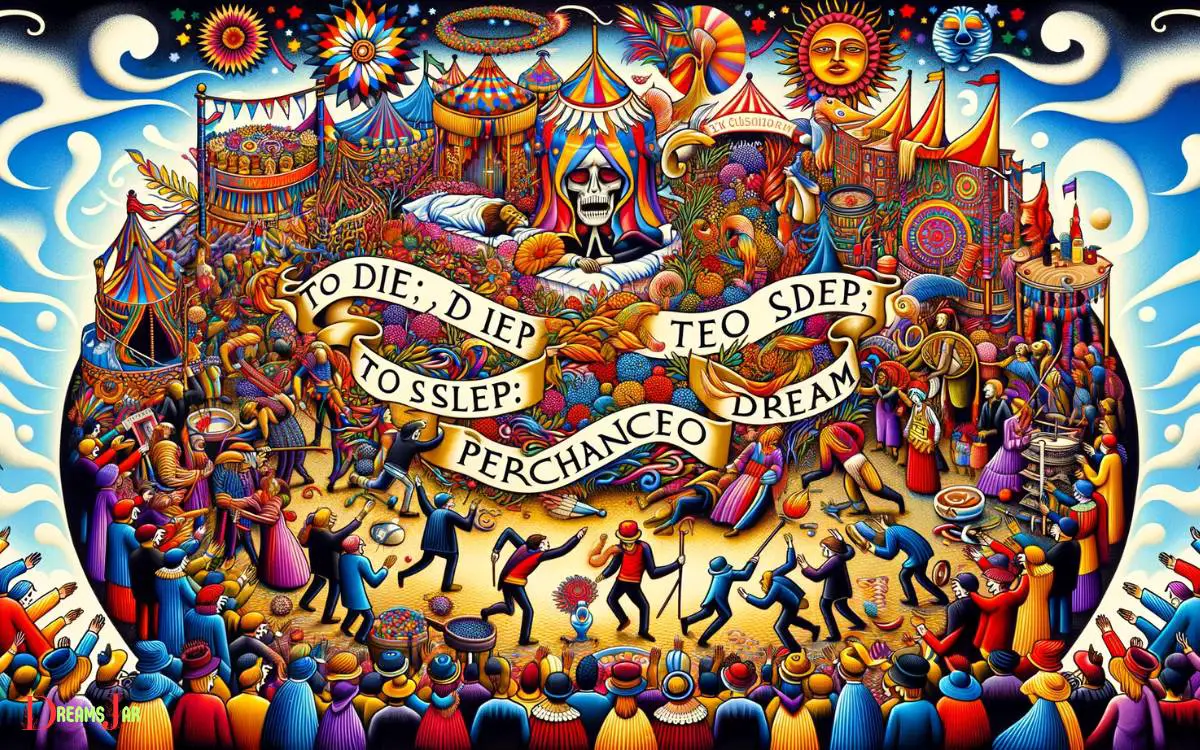To Die to Sleep to Sleep Perchance to Dream Meaning: Explain
“To die, to sleep; To sleep: perchance to dream” is a famous line from William Shakespeare’s play, Hamlet, which reflects the character’s contemplation of death and the possibility of dreams in the afterlife.
In Hamlet’s famous “To be, or not to be” soliloquy, the character Hamlet is pondering the nature of existence and considering the appeal of death as an escape from the pains and unfairness of life.
The quote “To die, to sleep; To sleep: perchance to dream” expresses Hamlet’s thoughts that death might be like a deep, peaceful sleep. However, the word “perchance” (meaning “perhaps” or “possibly”) introduces the uncertainty of what comes after death.
Hamlet wonders if in that “sleep of death,” one might dream, and what kind of dreams may come. This consideration makes him anxious about what awaits in the afterlife, leading to further reflection on the fear of the unknown that so often prevents us from taking decisive action.
Exploring themes of existence and the afterlife, Hamlet’s introspection on the uncertain boundary between life and death continues to resonate with audiences worldwide.

Key Takeaway
8 Phrases: To Die to Sleep to Sleep Perchance to Dream Meaning
| Phrase | Source | Meaning | Context in Source | Significance in Literature |
|---|---|---|---|---|
| To die, to sleep | Hamlet by William Shakespeare | To die is to enter a state similar to sleep. | Hamlet’s soliloquy | Contemplation of death and life |
| To sleep, perchance to Dream | Hamlet by William Shakespeare | Sleep might bring dreams or an afterlife, which is uncertain and can be daunting. | Hamlet’s soliloquy | Fear of the unknown after death |
| Ay, there’s the rub | Hamlet by William Shakespeare | The problem or obstacle is in the uncertainty of what dreams or afterlife may hold. | Hamlet’s soliloquy | Hesitation to face the unknown |
| For in that sleep of death | Hamlet by William Shakespeare | Death is compared to a sleep that might be filled with dreams (or nightmares). | Hamlet’s soliloquy | Metaphor for death |
| What dreams may come | Hamlet by William Shakespeare | The dreams or experiences that may occur after death are unknown and a cause for worry. | Hamlet’s soliloquy | Uncertainty about afterlife |
| When we have shuffled off this mortal coil | Hamlet by William Shakespeare | Refers to dying and leaving the physical body behind. | Hamlet’s soliloquy | Liberation from life’s troubles |
| Must give us pause | Hamlet by William Shakespeare | The consideration of the afterlife and its unknowns causes us to stop and think. | Hamlet’s soliloquy | Reflection before action |
| That makes calamity of so long life | Hamlet by William Shakespeare | The dread of the unknown after death makes the troubles of life seem long and unbearable. | Hamlet’s soliloquy | Reason for enduring life’s hardships |
Historical Context
I often find that understanding the historical context of a topic is crucial for gaining a comprehensive perspective.

When delving into the meaning of the phrase “To die, to sleep, to sleep, perchance to dream,” it’s essential to consider the historical backdrop in which it was written.
This famous line from Shakespeare’s Hamlet reflects the Elizabethan era’s attitudes towards life, death, and the afterlife. During this time, there was a pervasive belief in the supernatural, and the concept of death was intertwined with religious and philosophical ideologies.
Additionally, the play was crafted at a time of political unrest and uncertainty, which influenced Shakespeare’s portrayal of existential struggles.
Recognizing these historical influences allows us to appreciate the depth and richness of the phrase, providing insight into the human condition across different time periods.
Linguistic Analysis
As I look at the POINTS for our discussion on linguistic analysis, I find it fascinating how word choice can impact the interpretation of a text.

Exploring the intricacies of language and its relationship to interpretation is crucial in understanding the depths of meaning within a piece of writing.
It’s intriguing to consider how different languages and their nuances can shape the way we understand and interpret literature.
Word Choice Impact
The article explores the impact of word choice on conveying meaning and the nuances of language. Words hold immense power in shaping the intended message and evoking specific emotions.
The selection of words can influence the tone, connotation, and overall interpretation of a piece of writing.
For instance, the use of “slumber” instead of “sleep” conveys a sense of peacefulness and tranquility, while “demise” instead of “death” can evoke a more solemn and serious tone.
Additionally, word choice can reflect cultural and historical contexts, adding layers of meaning to the text. Understanding the impact of word choice is crucial for effective communication and conveying the intended message accurately.
As we delve into language and interpretation, it becomes evident that each word carries substantial weight in shaping our understanding of the world.
Language and Interpretation
Delving into the nuances of language and interpretation, it’s essential to understand how linguistic analysis shapes our understanding of written and spoken communication.
Language is a powerful tool that conveys not just words, but also emotions, intentions, and cultural nuances. Through linguistic analysis, we can dissect the structure, meaning, and context of language to unearth deeper layers of understanding.
This involves examining syntax, semantics, and discourse patterns to decode implicit messages and cultural connotations. As a result, linguistic analysis helps us navigate the complexities of language and bridge potential gaps in interpretation.
By understanding the intricacies of language, we can foster clearer and more effective communication.
It allows us to appreciate the richness of different languages and their impact on our perceptions and interactions, leading to a more inclusive and empathetic approach to communication.
Philosophical Interpretation
As I ponder the philosophical interpretation of dreams, I find myself drawn to the profound questions about existence and purpose that arise from our nocturnal experiences.

The connection between consciousness and the subconscious mind becomes a focal point as we explore the significance of dreams in shaping our understanding of reality.
The intricate interplay between the dream state and waking life beckons us to contemplate the boundaries and intersections of these two distinct yet interconnected realms of human experience.
Existence Purpose in Dreams
My philosophical interpretation of dreams’ existence purpose delves into the interconnectedness of the subconscious mind and the human experience.
Dreams serve as a manifestation of our innermost thoughts, fears, and desires, offering a glimpse into the depths of our subconscious.
From a philosophical standpoint, dreams provide a platform for introspection and self-discovery, enabling individuals to explore their existential purpose and confront unresolved emotions.
They offer a unique lens through which we can unravel the complexities of our consciousness, providing insights into our psyche and guiding us towards a deeper understanding of our existence.
By unraveling the symbolism and themes within our dreams, we can gain valuable insights into our waking lives, fostering personal growth and self-awareness.
Ultimately, the existence purpose of dreams lies in their ability to enrich our human experience by offering a gateway to profound introspection and self-understanding.
Consciousness and Subconscious Connection
I believe that the interconnectedness between consciousness and the subconscious mind is a fundamental aspect of human experience.
- Our conscious thoughts and feelings often stem from the deeper layers of our subconscious mind, shaping our perceptions and behaviors without our immediate awareness.
- Exploring the subconscious can offer valuable insights into our fears, desires, and motivations, shedding light on aspects of ourselves that may influence our waking lives.
- The profound connection between consciousness and the subconscious mind raises philosophical questions about the nature of reality and the limits of human understanding.
- Understanding this connection can lead to a deeper appreciation of the complexity of human cognition and the intricacies of our inner worlds, enriching our grasp of the human experience.
Reality Vs Dream State
In my exploration of the philosophical interpretation of reality versus dream state, I have come to understand the profound implications of the subconscious mind on our perceptions and experiences.
Here’s a comparison between reality and dream state:
| Reality | Dream State |
|---|---|
| Objective, external world | Subjective, internal world |
| Consistent and logical | Often fantastical and irrational |
| Influenced by sensory input | Influenced by emotions and memories |
| Shared experiences | Highly personal experiences |
| Shapes our waking life | Often forgotten upon waking |
The stark differences between these two states prompt us to question the nature of reality and the role of our subconscious in shaping our understanding of the world.
As we consider these disparities, it becomes evident that our perceptions are not solely based on external stimuli but are deeply intertwined with our internal thoughts and emotions. This realization leads us to delve into the psychological perspective on this matter.
Psychological Perspective
Understanding the psychological implications of dreaming can offer valuable insights into the human mind and its subconscious workings.

From a psychological perspective, dreams can be interpreted in various ways, shedding light on our inner thoughts and emotions:
- Unconscious Desires: Dreams may reveal unconscious desires and fears that we may not be aware of during waking hours.
- Emotional Processing: Dreaming allows the mind to process and make sense of complex emotions, experiences, and memories.
- Problem Solving: Some psychologists believe that dreams may help in problem-solving by presenting alternative perspectives and solutions to real-life challenges.
- Self-Exploration: Analyzing dreams can provide a platform for self-exploration and understanding one’s deeper motivations and conflicts.
Exploring dreams from a psychological standpoint can offer a deeper understanding of the human psyche and its intricate workings.
Cultural Significance
Dreams hold significant cultural value across diverse societies, reflecting beliefs, traditions, and societal norms.

From unconscious desires to emotional processing, dreams play a pivotal role in shaping cultural narratives and practices. In my research, I found that different cultures have unique interpretations and beliefs about dreams.
Here is a table summarizing some cultural beliefs about dreams:
| Culture | Dream Significance |
|---|---|
| Chinese | Dreams are seen as a means of connecting with the spirit world. |
| Aboriginal | Dreams are a way of receiving messages from ancestors. |
| Egyptian | Dreams were considered to be divine communications. |
| Tibetan | Dream yoga is practiced to achieve spiritual enlightenment. |
| African | Dreams are believed to provide insight into the future. |
It’s fascinating to see how dreams are intertwined with cultural practices and beliefs, shaping the way people perceive and understand the world around them.
Literary Exploration
Exploring the literary significance of dreams reveals their multifaceted portrayal in various works of literature.

- Symbolism: Dreams are often used symbolically in literature to represent subconscious desires, fears, or unresolved conflicts.
- Foreshadowing: Authors frequently use dreams to foreshadow events or to provide insight into the characters’ inner thoughts and emotions.
- Psychological Depth: The portrayal of dreams allows authors to delve into the psychological depths of their characters, providing a richer understanding of their motivations and struggles.
- Narrative Ambiguity: Dreams blur the lines between reality and imagination, adding layers of complexity to the narrative and inviting readers to question the nature of truth and perception.
Through these literary explorations, dreams become a powerful tool for authors to convey deeper meanings and provoke contemplation, enriching the reader’s experience.
Modern Relevance
In modern literature, dreams continue to serve as a conduit for delving into characters’ subconscious thoughts and emotions.

Authors often use dreams to provide insight into a character’s inner conflicts, desires, and fears. By exploring characters’ dreams, writers can add depth and complexity to their narratives, allowing readers to connect with the characters on a more profound level.
Additionally, in today’s fast-paced and interconnected world, where mental health awareness is increasingly emphasized, the portrayal of dreams in literature can offer a means of understanding and processing the complexities of the human mind.
As readers, we can find solace in knowing that our own dreams and subconscious experiences are not isolated but rather shared and understood through the lens of modern literature.
Conclusion
So, to die, to sleep, to sleep, perchance to dream. Could it be that these words hold the key to understanding the human experience?
Through historical, linguistic, philosophical, psychological, cultural, and literary lenses, we see the depth and complexity of this famous line from Hamlet.
But in the end, do we truly grasp the full meaning and significance of these words, or are they destined to remain a mystery?






